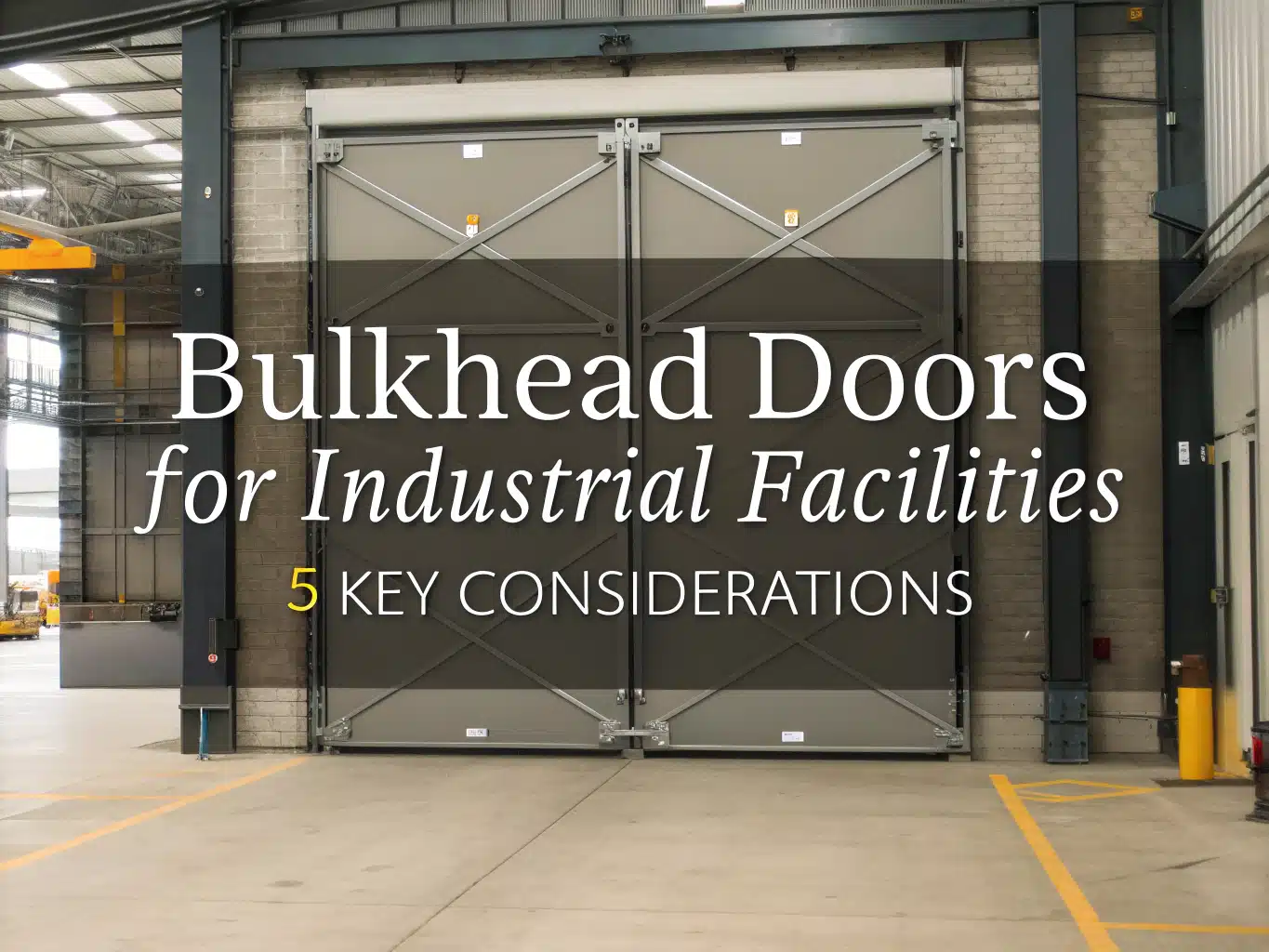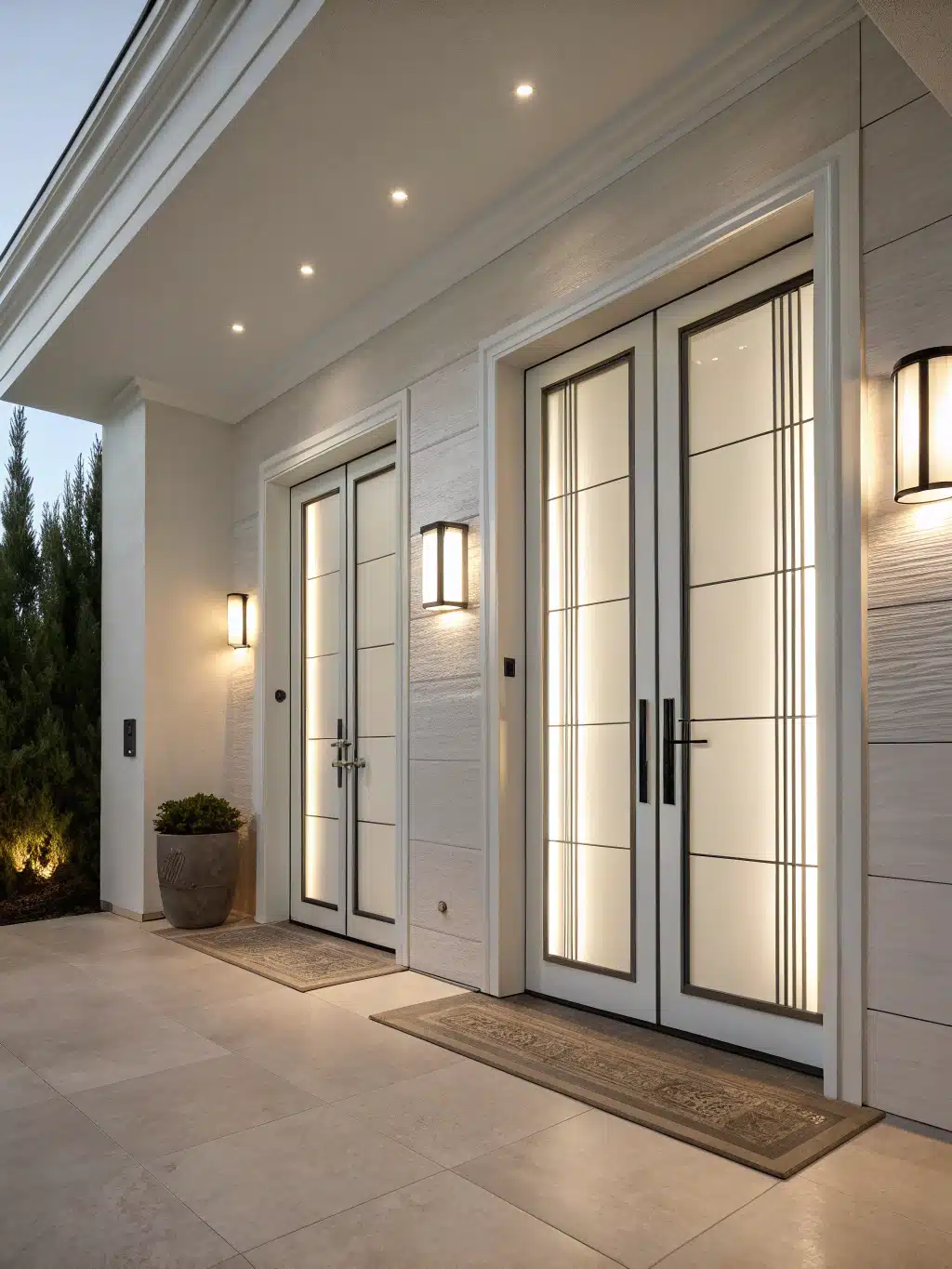
Have you ever stopped to think about the details that go into choosing the right doors for an industrial facility? When it comes to bulkhead doors, there’s a lot more than just swinging open and shut involved. Understanding the factors like material quality, safety features, and environmental resilience is key. Let’s take a closer look at what makes these features so vital in ensuring both functionality and security for your facility.
Industrial bulkhead doors serve as critical security and access control components for facilities requiring reliable protection of basement areas, storage zones, and sensitive operational spaces. The industrial door market, which includes bulkhead doors, reached USD 4.25 billion in 2024 and projects growth to USD 6.65 billion by 2033, reflecting increasing demand for specialized facility security solutions.
Introduction to Industrial Bulkhead Doors
Market Overview and Applications
Bulkhead doors function as specialized entry points for industrial facilities, providing secure access to below-grade areas and critical infrastructure zones. These doors commonly protect loading docks, utility areas, emergency exits, and storage facilities where controlled access remains paramount. Manufacturing plants, warehouses, data centers, and chemical processing facilities rely on bulkhead doors to maintain operational security while allowing necessary personnel and equipment movement.
Core Functions: Security, Access Control, and Safety
The primary functions of industrial bulkhead doors center on three key areas:
- Security protection against unauthorized access and potential threats
- Access control integration with facility management systems
- Safety compliance for emergency egress and fire protection standards
- Environmental separation between interior and exterior spaces
Industrial Door Market Growth and Projections
Market analysis shows the industrial door sector experiencing steady expansion at a 5.1% compound annual growth rate. This growth stems from increased facility security requirements, regulatory compliance demands, and operational efficiency improvements across industrial sectors.

Material Durability and Construction Quality
Steel Construction: The Industrial Standard
Steel construction dominates industrial bulkhead door manufacturing due to its superior strength, impact resistance, and longevity under demanding operational conditions. Heavy-gauge steel panels withstand frequent use, equipment contact, and environmental stresses that would compromise lighter materials. The structural integrity of steel doors maintains security standards while supporting automated opening mechanisms and integrated locking systems.
Weather-Resistant Finishes and Protective Coatings
Protective finishes play a critical role in extending door lifespan and maintaining appearance. Primer coatings provide base protection against corrosion, while powder-coated finishes offer enhanced durability and color retention. Galvanized steel options deliver superior rust resistance for facilities exposed to moisture, chemicals, or harsh environmental conditions.
Alternative Materials and Their Applications
Aluminum construction offers weight advantages for specific applications requiring frequent manual operation or reduced structural load. Composite materials provide corrosion resistance in chemical processing environments. However, steel remains preferred for most industrial applications due to its balance of strength, security, and cost-effectiveness.
Long-Term Durability Considerations
Quality construction materials directly impact total cost of ownership through reduced maintenance requirements and extended service life. Industrial-grade hardware, reinforced hinges, and commercial-quality springs contribute to reliable long-term performance. Facilities should evaluate material specifications against operational demands and environmental exposure levels.
Security Features and Access Control Systems
Integrated Locking Mechanisms and Reinforced Panels
Multi-point locking systems provide enhanced security through multiple engagement points along the door frame. Reinforced panels resist forced entry attempts while maintaining structural integrity under normal operational stress. Deadbolt mechanisms, cylinder locks, and electronic access controls integrate seamlessly with facility security protocols.
Compliance with Industry Safety and Fire Protection Standards
Industrial bulkhead doors must meet specific safety codes and fire protection requirements based on facility type and local regulations. Fire-rated options provide critical protection for facilities handling hazardous materials or requiring emergency egress compliance. Understanding these requirements helps facilities select appropriate door specifications and avoid costly retrofits.
For comprehensive information about fire protection requirements, visit our fire-rated doors section.
Sensor Technology and Automated Access Systems
Modern access control integration includes proximity sensors, keycard readers, and biometric systems for automated operation. These systems log entry events, restrict access based on authorization levels, and integrate with facility-wide security monitoring. Remote monitoring capabilities allow security personnel to track door status and respond to unauthorized access attempts.
High-Security Door Solutions for Critical Facilities
Critical infrastructure facilities require enhanced security features including tamper-resistant hardware, reinforced frames, and blast-resistant construction. High-security applications may specify ballistic-rated panels, specialized locking mechanisms, and integration with perimeter security systems.
Weatherproofing and Environmental Protection
Watertight Seals for Moisture and Contaminant Protection
Watertight sealing prevents moisture infiltration that could damage equipment, compromise stored materials, or create safety hazards. Industrial facilities often require protection against dust, chemical vapors, and environmental contaminants that standard residential doors cannot provide. Proper sealing maintains controlled environments for sensitive operations and storage.
Weatherstripping and Seal Upgrade Options
Quality weatherstripping systems create effective barriers against air infiltration, moisture penetration, and energy loss. Replacement seal kits allow facilities to maintain optimal performance as original seals age or become damaged. Regular seal inspection and replacement prevents minor issues from developing into costly problems.
Professional weatherstripping solutions help maintain optimal door performance:

Bilco Door Weatherstrip Kit
- Complete seal kit for Bilco doors
- Protects against weather infiltration
- Easy installation with self-adhesive strips
- Enhances energy efficiency
- Five-year replacement promise

Bilco Door Seal Replacement Kit
- Complete weatherproofing solution
- Easy installation to save time
- Protects against drafts and leaks
- Includes U-shaped and bulb gaskets
- Reliable for long-term use
Energy Efficiency Through Proper Environmental Separation
Effective environmental separation reduces heating and cooling costs while maintaining comfortable working conditions. Energy-efficient doors contribute to facility sustainability goals and operational cost reduction. Thermal breaks and insulated panels provide additional energy savings for climate-controlled facilities.
Retrofit Solutions for Existing Installations
Existing facilities can improve performance through seal upgrades, weatherstripping replacement, and hardware modifications. Retrofit options offer cost-effective improvements without complete door replacement. Professional assessment identifies specific upgrade opportunities based on current performance and operational requirements.
Ergonomics and Operational Efficiency
Addressing Workforce Aging and Labor Competition
Industrial facilities face challenges from workforce aging and competitive labor markets that require attention to employee comfort and safety. Doors requiring excessive physical effort create operational bottlenecks and potential injury risks. Ergonomic design considerations reduce physical strain while maintaining security and functionality requirements.
Automated and Hydraulically Assisted Designs
Automated opening systems eliminate manual lifting requirements while providing consistent operation regardless of operator strength or size. Hydraulic assistance reduces opening force requirements for heavy steel doors. Spring-balanced mechanisms distribute weight evenly, making manual operation manageable for all personnel.
Emergency Egress and Rapid Access Requirements
Emergency situations require quick, reliable door operation without complicated procedures or excessive force. Emergency egress features include panic hardware, automatic unlocking systems, and clearly marked operation instructions. Rapid access capabilities support emergency response teams and evacuation procedures.
Safety-Driven Design for Injury Prevention
Safety-focused design elements prevent common workplace injuries associated with door operation. Injury prevention features include smooth operation mechanisms, finger guards, and non-slip surfaces. Proper door sizing prevents awkward lifting positions and reduces strain-related injuries.
Installation, Sizing, and Maintenance Requirements
Proper Sizing for Industrial Loads and Equipment
Accurate sizing accommodates typical facility traffic including personnel, carts, forklifts, and emergency equipment. Undersized doors create operational constraints and safety hazards. Oversized installations waste resources and may compromise security. Professional assessment determines optimal dimensions based on operational requirements and structural constraints.
Installation Best Practices for Optimal Performance
Professional installation practices include precise frame alignment, proper anchoring, and complete weatherproofing integration. Quality installation prevents operational problems and premature wear. Structural assessment confirms adequate support for door weight and operational forces.
Regular Maintenance for Springs, Hinges, and Seals
Planned maintenance programs address wear components before failure occurs. Regular maintenance includes spring adjustment, hinge lubrication, seal inspection, and hardware tightening. Maintenance schedules should reflect usage intensity and environmental exposure levels.
Custom Sizing and Retrofit Options
Custom sizing accommodates unique facility requirements and existing structural constraints. Retrofit solutions work within existing openings while improving performance and functionality. Professional consultation identifies optimal solutions for specific facility needs and budget constraints.
For specialized basement applications, explore our basement door options.
Top Product Recommendations for Industrial Applications
These proven bulkhead door solutions offer reliable performance for industrial facility applications:

Sturdy Bulkhead Basement Door
- Designed for easy outdoor access
- Durable steel construction for longevity
- Weather-resistant to protect against the elements
- Angled openings for convenient entry
- Secure design enhances basement safety

BILCO Basement Door, Size B
- Reliable protection for your basement
- Prime-coated finish for easy painting
- Solid steel construction ensures durability
- Space-efficient design fits most homes
- Easy installation process

BILCO Size C Basement Door
- Enhanced security for basement access
- Primer finish ready for painting
- Built with heavy-duty steel
- Designed to fit larger entryways
- Quick and straightforward installation

BR Sloped Wall Basement Door
- Ideal for sloped wall applications
- Provides a secure basement entry
- Weather-resistant for outdoor durability
- Customizable size options
- Easy to open and close

Window Well Supply Bulkhead Doors
- Accessible design for convenience
- Sturdy build for lasting use
- Weatherproof to withstand harsh conditions
- Angled opening maximizes space
- Enhances home safety
Future Trends and Smart Door Technology
Integration with Security Systems and Remote Monitoring
Smart door technology connects bulkhead doors with facility-wide security networks for comprehensive monitoring and control. Remote access capabilities allow security personnel to monitor door status, control access, and respond to security events from central locations. Integration with existing security infrastructure provides seamless operation and enhanced protection.
Energy-Efficient and Eco-Friendly Materials
Sustainable manufacturing practices and eco-friendly materials address environmental concerns while maintaining performance standards. Recycled steel content, low-impact coatings, and energy-efficient designs support facility sustainability goals. Green building certifications increasingly recognize door specifications in overall facility ratings.
Market Growth Projections for 2025 and Beyond
Industry projections indicate continued growth in industrial door markets driven by facility security requirements, regulatory compliance, and operational efficiency demands. Market expansion reflects increasing recognition of door systems as critical infrastructure components rather than simple access points.
Smart Industrial Door Solutions
Advanced door systems incorporate sensors, automated controls, and predictive maintenance capabilities. Smart solutions provide real-time performance data, maintenance alerts, and operational analytics. These systems optimize facility operations while reducing maintenance costs and improving security effectiveness.
Stay informed about the latest developments by visiting our industry blog for ongoing updates and insights.
FAQs
What Is A Bulkhead Door Used For?
A bulkhead door is typically used as an exterior access point to a basement or cellar, allowing for convenient entry or exit. These doors are often installed on sloping ground surfaces and are designed to protect entrances from weather conditions such as rain and snow.
How Do You Install A Bulkhead Door?
Installing a bulkhead door generally involves measuring the opening, purchasing a door that fits, and ensuring a proper seal to prevent water ingress. It often requires cutting into existing structures, so it’s advisable to consult with a professional for precise installation or refer to manufacturer guidelines.
What Are The Different Types Of Bulkhead Doors?
There are several types of bulkhead doors including metal, wooden, and composite models. Metal doors are durable and provide high security, wooden doors offer a traditional look, and composite doors blend strength and insulation. The choice depends on aesthetic preference, budget, and functional need.
Can Bulkhead Doors Be Insulated?
Yes, bulkhead doors can be insulated to enhance energy efficiency and prevent heat loss. Insulation can be added between panels or through special insulating materials and coatings applied directly to the door. Proper insulation can also reduce noise and improve overall comfort.
Are Bulkhead Doors Required By Building Codes?
Building codes regarding bulkhead doors can vary based on location and specific use cases. Typically, local codes will dictate requirements for egress and accessibility that might apply to bulkhead doors, especially if they serve as an emergency exit. Always check with local authorities to ensure compliance.

Abdelbarie Elkhaddar
Glamorwood Ltd.
A door expert and home improvement writer with over 12 years of experience. I help homeowners and contractors choose smart, stylish, and secure doors.







Leave a Reply